At the elders’ mercy: The resilient pioneers transforming patriarchal politics in the North

From left: Fatuma Dullo, Sophia Abdi Noor, Dahaba Yusuf and Naomi Jillo Waqo. These trailblazing women are dismantling northern Kenya's male-dominated political machinery one election at a time.
What you need to know:
- Women in Kenya's northern regions are breaking centuries-old barriers by challenging "negotiated democracy".
- Despite facing financial demands, cultural opposition, and even threats of curses, pioneers like Sophia Abdi and Naisula Lesuuda have made history as the first women elected from their constituencies.
- Though progress is fragile, women's councils and international support are gradually shifting attitudes toward female leadership.
In the dry sandy plains of Ijara, a collective gasp rippled through the community when Sophia Abdi shocked residents by announcing her parliamentary bid ahead of the 1997 General Election. The winds carried whispers of disbelief as elders, women, and youth alike struggled to comprehend this unprecedented move.
"Everybody, including elders, women and girls, called me a mad woman," Sophia recalls, her voice steady despite the memory of such widespread derision. "I, however, remained firm and pushed on. Having been a teacher, all the teachers stood by me and gave me their support."
Running on a Kanu ticket, then the dominant political party in the region, Sophia defied expectations by emerging victorious in the party primaries, outmanoeuvring seasoned male politicians at their own game. The sweet taste of victory was evident as she clutched her nomination certificate at the Kenyatta International Convention Centre (KICC) in Nairobi, surrounded by top Kanu officials.
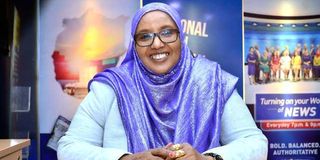
Former Ijara MP Sophia Abdi at Nation Centre, Nairobi.
But her joy was short-lived. Behind closed doors, elders and religious leaders lobbied Kanu's highest decision-making organ, demanding the cancellation of her nomination. Their argument was simple and devastating: their culture and religion prohibited women from leadership. The party acquiesced, and Sophia's nomination was revoked.
This setback, however, merely marked the beginning of her journey, not its end. Sophia went on to become "a sterling example of a resilient female politician in a deeply patriarchal community," continuing to influence local and national politics despite the obstacles.
Her persistence eventually bore fruit when she became the first woman from North Eastern to be nominated to parliament by the Orange Democratic Movement (ODM) party in 2007. Though she lost her bid for the Ijara parliamentary seat in 2013, she secured a nomination from the Jubilee coalition to serve in the 11th Parliament.
Her defining moment came in 2017 when she finally won the Ijara parliamentary seat on the ticket of the little-known Party for Development and Reforms, defeating incumbent Ahmed Ibrahim Abass, making history as the first elected woman MP from the region.
Victory didn't shield her from ongoing resistance. "Some started going round the constituency telling locals that al Shabaab attacks were rampant in the area because they elected a woman. Others said the area was experiencing severe drought because a woman was the MP," she reveals.
The heavy hand of tradition
For decades, communities in North Eastern Kenya have maintained conservative views about women's leadership based on religious and cultural interpretations. Before Sophia's breakthrough in 2017, no woman had ever been elected to represent a single constituency in the region since Independence.
"Our religion does not advocate for women to run for political positions," explains Sheikh Abdihafit Ismail.
"We do not want the woman to lead. The woman has to be behind or below a man. She cannot be at the forefront."
This sentiment echoes across Kenya's northern frontier, where councils of elders – known locally as Sultanate at the clan level and Ugasin at the sub-clan level in Wajir – wield enormous influence over who can vie for political leadership.
"This is our culture and religion. The way we live is a result of our culture and religion. Women always take instruction from the elders," states Bishal Ahmed, a Sultanate member.
The council's power extends beyond cultural influence. During elections, they effectively function as a pre-screening mechanism, accepting applications from aspiring candidates and conducting vetting exercises to determine who is "fit and best placed" to run. Only those endorsed by elders are expected to present their papers to the Independent Electoral and Boundaries Commission (IEBC).
These Sultanate and Ugasin committees are typically composed of opinion leaders and business magnates – exclusively men. Women are systematically excluded from these powerful decision-making bodies.
The price of political ambition
The path to leadership comes with literal costs, creating additional barriers for women aspirants.
"During the last election, each MP aspirant was required to pay Sh200,000 to the Sultanate," reveals Adanoor Mohammed, a youth leader cum male champion in Wajir. The non-refundable application fees, varying by position, create a substantial financial barrier, particularly for women candidates who often have less access to financial resources.
After a "vigorous vetting exercise," the elders name their chosen candidates, who then swear an oath accepting the outcome as final. The endorsed candidates receive the elders' full support as they campaign across wards, constituencies, and the entire county.
"The chances of an aspiring woman to be selected by the Sultanate to run for any political seat is narrow. I would peg it at one out of 10," observes Adanoor. "The system is cartel-like; it does not consist of women and the youth. It is also dogged by bribery, nepotism and clannism claims."
Adanoor believes negotiated democracy should never be entertained as it rarely leads to the election of leaders with the people's best interests at heart.
Bishal Ahmed, however, defends the system vigorously. "The people we pick for the positions must meet certain qualifications. They must be honest, religious, development-conscious and not corrupt," he insists, dismissing accusations of bias as "baseless and negative propaganda."
He argues that claims of discrimination against women are exaggerated, pointing to the two women MCAs elected in Wajir with elders' support as evidence of their openness.
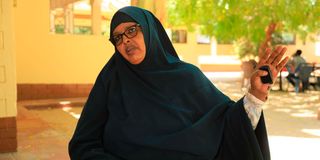
Banane MCA Dahaba Yusuf during an interview in Wajir town on February 26, 2025. She is one of the two female MCAs elected in Wajir County in 2022.
One of those two female MCAs is Dahaba Yusuf, representing Banane Ward. She understands better than most the necessity of securing the elders' blessing.
"I convinced the elders to pick me. I showed them my track record of development and they agreed," she recounts, remembering her first challenge in the 2022 election. "If they had not picked me, that would have been the end of my leadership journey. The men in the race defied the decision of the elders and ran against me, they gave me a difficult time but eventually lost."
As the only woman facing four male competitors, including her own cousin (whose candidacy caused significant family discord), Dahaba had to work doubly hard to convince residents she was best suited for the job.
Beyond the social challenges, the financial burden was immense. "Conducting a serious campaign is expensive, more so in an area that is vast like my ward. I incurred huge debts that I am still repaying today. The campaign affected me financially so much, as the ward is vast and requires a lot of resources to transverse. I have yet to recover financially."
Wajir Deputy Governor Ahmed Muhumed acknowledges the difficulties women face in politics, including the risk of violence, but encourages more women to offer themselves for leadership. "Women must come out and offer themselves for political leadership. They have the power to vote for one of their own as they are the majority. I know Kenya's political terrain is rough and at times is not conducive to women candidates."
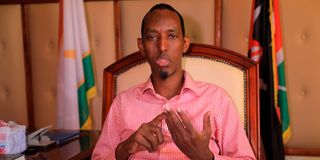
Ahmed Muhumed, Wajir deputy governor, speaks in his Wajir town office on February 25, 2025. He says women mostly shy away from vying for political seats because of the rough nature of the contests and campaigns.
The challenges of negotiated democracy extend well beyond Wajir County. About 600 kilometres away in Samburu County, similar dynamics are at play.
John Leng'erded, a youth leader and Uraia Trust county coordinator, explains that women and youth are routinely side-lined in decision-making. Even personal details become weapons against women candidates.
"If one is not married, she has no right to be elected. This challenge mostly affects women, whose marital status is turned into a campaign tool," he reveals, highlighting how cultural norms create additional barriers for women.
Samburu West MP Naisula Lesuuda, one of the few women parliamentarians from a pastoralist community, faced these weapons first-hand.
"I faced a lot of attacks. I saw hell on earth for me when I first ran for MP," she reflects.
"I was told that I was not married, and that I had not undergone female genital mutilation (FGM). I was also told to my face that the people were not ready for a woman MP. I was told to go for the woman representative seat reserved for women."
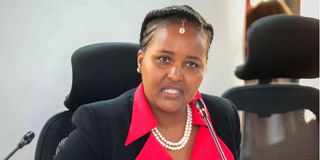
Samburu West MP and member of the National Assembly Public Accounts Committee Naisula Lesuuda at Bunge Tower Nairobi on April 17, 2025.
Despite these attacks, she persevered and made history as the first woman elected to represent a single constituency in Samburu County.
Samuel Lolkitekui, a Samburu elder and HeforShe champion, acknowledges culture's role in hindering women's political advancement but sees positive changes emerging.
"It is important to involve women in leadership. They form part of the majority; hence it is unfair to side-line them. To ensure inclusive development, women need to be at the decision table."
He adds optimistically, "There is light at the end of the tunnel. Men and elders in pastoralist communities are now embracing women's leadership, which is a good sign. Women form half of the population, hence the need to bring them to the decision table."
Hundreds of kilometres from the northern counties, in Narok, the scenario was no different for Soipan Tuya, who sought the gubernatorial position in the 2022 General Election.
Despite serving two terms as Narok Woman Representative and coming from a political family (her father Samson ole Tuya had served as Narok South MP), Soipan abandoned her quest just months before the election. Her withdrawal followed a deal brokered by then-Deputy President William Ruto (now President) that pitted her against Narok West MP Gabriel Tongoyo and former Labour Chief Administrative Secretary Patrick Ntutu (now governor).
"We realised that our competitors were a bit organised and had picked one candidate. We also had to settle on one candidate to champion cohesive politics. I have since convinced my supporters to accept my decision and they have agreed," Soipan explained to journalists at the time.

Defence Cabinet Secretary Nominee Soipan Tuya before the Committee on Appointments at the County Hall Nairobi on August 1, 2024. Despite serving two terms as Narok Woman Rep, she abandoned her quest just months before the election.
William Mbanyamlenge, project officer for the Centre for Rights Education and Awareness (Creaw), describes Narok's political landscape bluntly: "Negotiated democracy is happening here in Narok. It is crazy here and the community is deeply patriarchal. Elders here are hostile to women's leadership and largely don't entertain it."
In traditional Maasai households, men were considered the heads of homes, livestock defenders, and leaders, while women's roles revolved around tending animals, milking cows, and childcare – a division that has heavily influenced modern political participation.
The additional burdens
The challenges for women voters are equally concerning. In northern Kenya, illiteracy rates among women remain high, forcing many to seek assistance in marking their ballots. This often compromises their ability to vote secretly for candidates of their choice, as their voting process is effectively monitored by polling agents.
The statistics tell a stark story: In northern Kenya, comprising Garissa, Wajir, Mandera, Isiolo, and Marsabit, only three women were elected as MCAs in the last election – two from Wajir and one from Isiolo. No woman was elected to represent a single constituency in Parliament. Isiolo, however, boasts a female senator, Fatuma Dullo. None of the counties has a woman governor.
Safi Abdullahi, a human rights activist and member of the Women Council of Elders in Wajir, criticises the vetting system's lack of transparency and inclusion.
"These Sultanate committees only comprise men; therefore, women seeking clearance from them start at a disadvantaged position. If you defy the decision of the elders and go to ballot without their blessings, they disown and curse you, which can have lethal consequences."
She argues that the system has become commercialised, with endorsements often going to the highest bidder. "The system should be left to handle pressing community issues and not political matters."
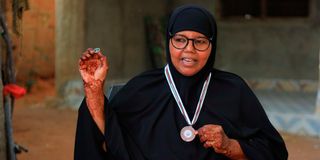
Safi Abdullahi, a human rights activist speaks to Nation.Africa on February 25, 2025 at her home in Wajir town. Safi who is a member of the Wajir Women Council of Elders is pushing for increased women political participation in Wajir County.
Despite these entrenched challenges, signs of progress are emerging. In 2021, Habiba Mohammed, a retired teacher and human rights activist, co-founded the Wajir Women Council of Elders to champion women's political participation.
"Things are changing and the community is slowly starting to embrace women's leadership," Habiba observes with cautious optimism.
"In the 2022 General Election, for example, we had 15 women from 15 clans who were nominated by the elders to run for MCA. Two of them won and became the first women elected MCAs. Our campaign played a critical role in realising these remarkable results."
The women elders now monitor the performance of these female MCAs closely.
"As women, we are always on the neck of the two MCAs, putting pressure on them to deliver," Habiba explains with determination. "If they fail, women will never be given a chance to lead again."
Breaking traditional moulds
Perhaps the most promising sign of evolving attitudes came recently in Marsabit County, where Woman Representative Naomi Waqo, received an unprecedented endorsement from Borana community elders for the 2027 gubernatorial race.
Naomi was crowned by her Fulele clan to be their standard-bearer in the upcoming contest, with elders declaring that the time is ripe for women's leadership – a remarkable shift in a community that historically viewed women leaders with deep suspicion. According to local belief, an ancient female leader named Ako Habonaye ruled with an iron fist before being killed by Rendille community warriors during a peacekeeping meeting, creating a lasting negative perception of women leaders.
Naomi is expected to face off with Saku MP Dido Rasso, who was endorsed by another section of Borana community elders in December 2023. The race is expected to attract additional candidates as 2027 approaches.
Importantly, negotiated democracy affects men as well as women, though women bear a disproportionate burden. In 2016, Ali Roba, former Mandera governor (now senator), defied elders who had barred him from seeking re-election.
The majority Garre clan elders had decreed that 24 politicians elected in the 2013 General Election, including Roba, were ineligible for re-election. Ali ignored the directive and successfully defended his seat in 2017 on a Jubilee Party ticket.
"The decision to elect, re-elect or remove leaders based on their manifesto or performance lies squarely with the electorate," he declared, championing democratic principles over traditional authority. After serving two gubernatorial terms, Ali ran for senator through his United Democratic Movement party and won in 2022.
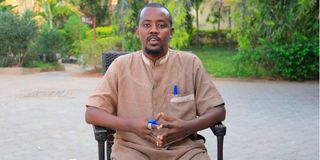
Sheikh Abdihafit Ismail speaks to Nation.Africa on February 26, 2025 in Wajir town. He says the Islamic religion does not encourage women leadership but acknowledges that they make better leaders.
International organisations are stepping in to accelerate progress. Wajir is one of seven counties benefiting from the "Expanding Spaces for Women Political Participation in Kenya" initiative led by Uraia Trust with support from UN Women and funding from Global Affairs Canada. Other beneficiaries include Samburu, Kisii, Homa Bay, Embu, Kericho, and Kajiado.
The initiative enhances women leaders' capacities while sensitizing men to the importance of women's political participation and leadership. This capacity building is crucial for changing mind-sets in patriarchal communities resistant to women's leadership.
"Advancing women's political participation requires a multifaceted approach that includes addressing legal and structural barriers, capacity building, amplifying the visibility of women leaders, gender-sensitive media coverage, and engagement of male allies to drive a positive shift in societal norms," explains UN Women Country Representative Antonia N'Gabala-Sodonon.
Janine Cocker, head of development cooperation at the Canadian High Commission in Nairobi, notes the initiative's positive impact. "There has been an increase of women leadership both at the national and county levels, which is commendable. A robust teamwork helped yield these wonderful results. Women need to be at the decision table," she tells Nation.Africa.
As northern Kenya's political landscape slowly transforms, the stories of women like Sophia Abdi, Naisula Lesuuda, and Dahaba Yusuf serve as powerful testaments to resilience in the face of deeply entrenched patriarchy.
Sheikh Abdihafit Ismail, despite his initial stance against women's leadership, acknowledges an important truth: "We support women's leadership as women make better leaders than their male counterparts do."
These pioneering women have shown that even the most entrenched systems can be challenged – and changed. Their journeys through the thorny thickets of negotiated democracy offer both inspiration and a sobering reminder of how far Kenya still must travel to achieve true gender equality in political leadership.
As the dust settles on past elections and the country looks toward 2027, the question remains: Will negotiated democracy adapt to include women's voices, or will women continue to forge paths around and through these traditional barriers to claim their rightful place in Kenya's political landscape?





